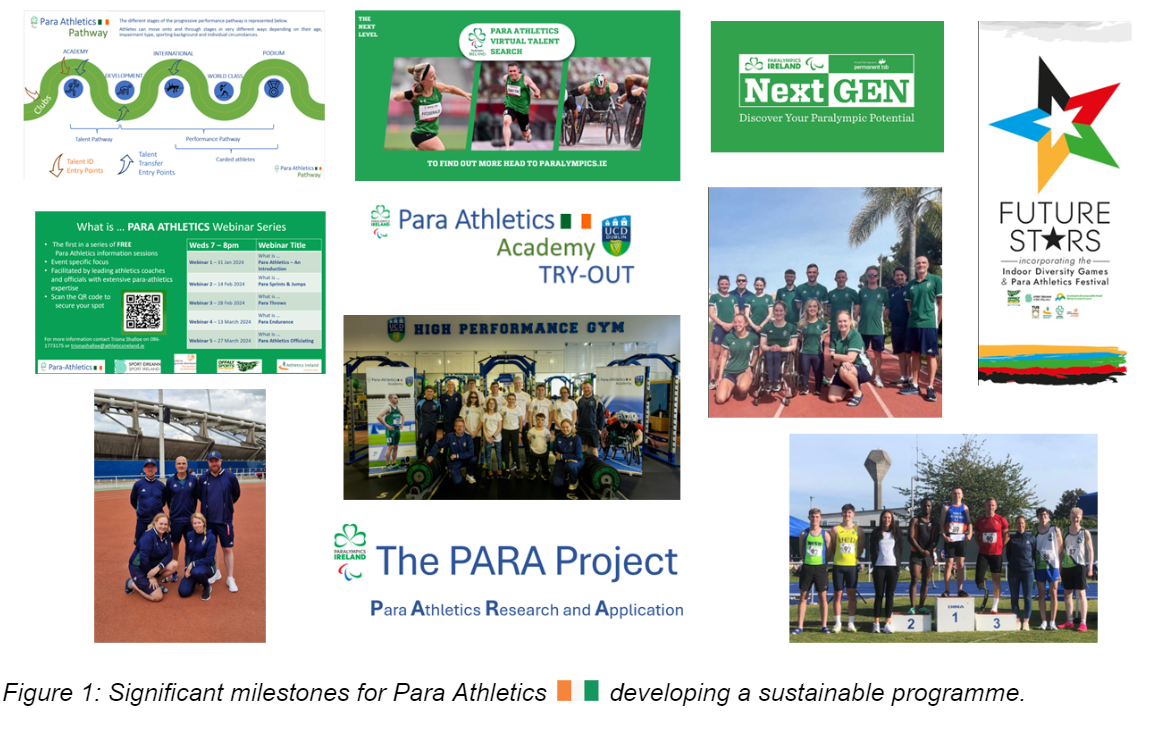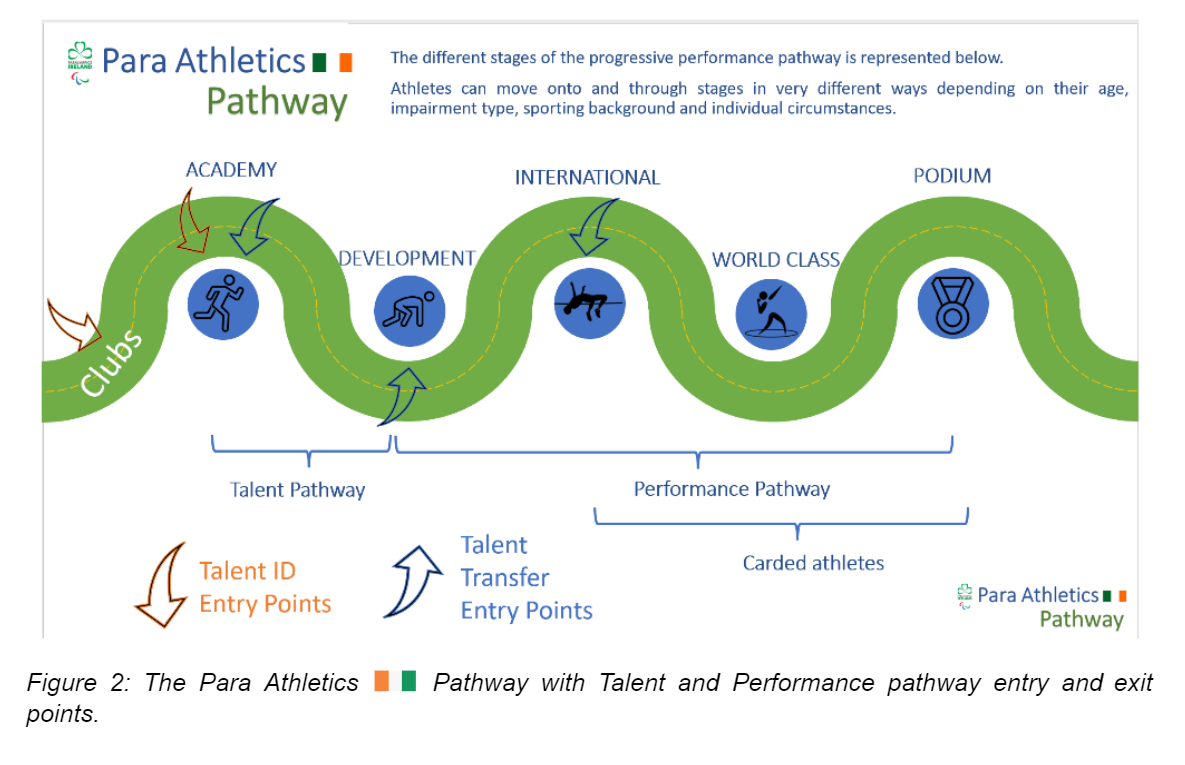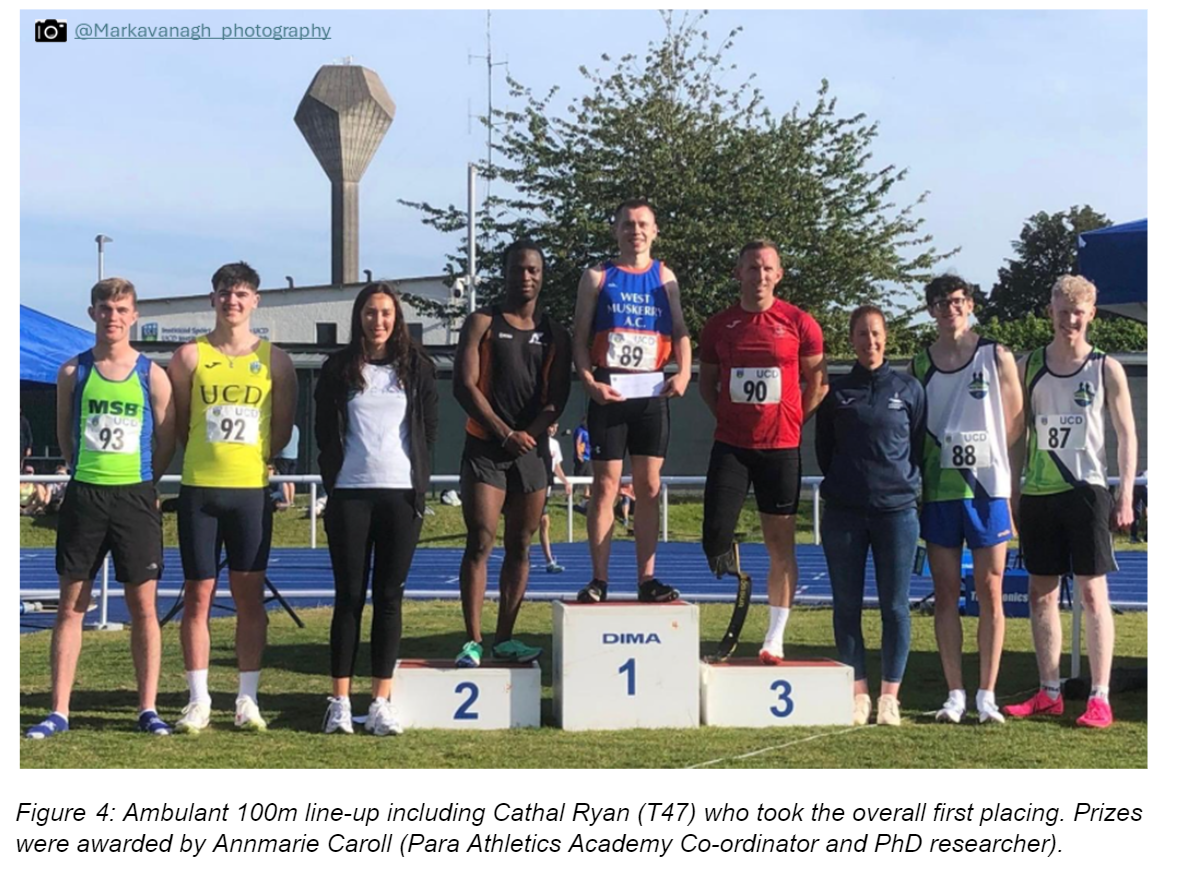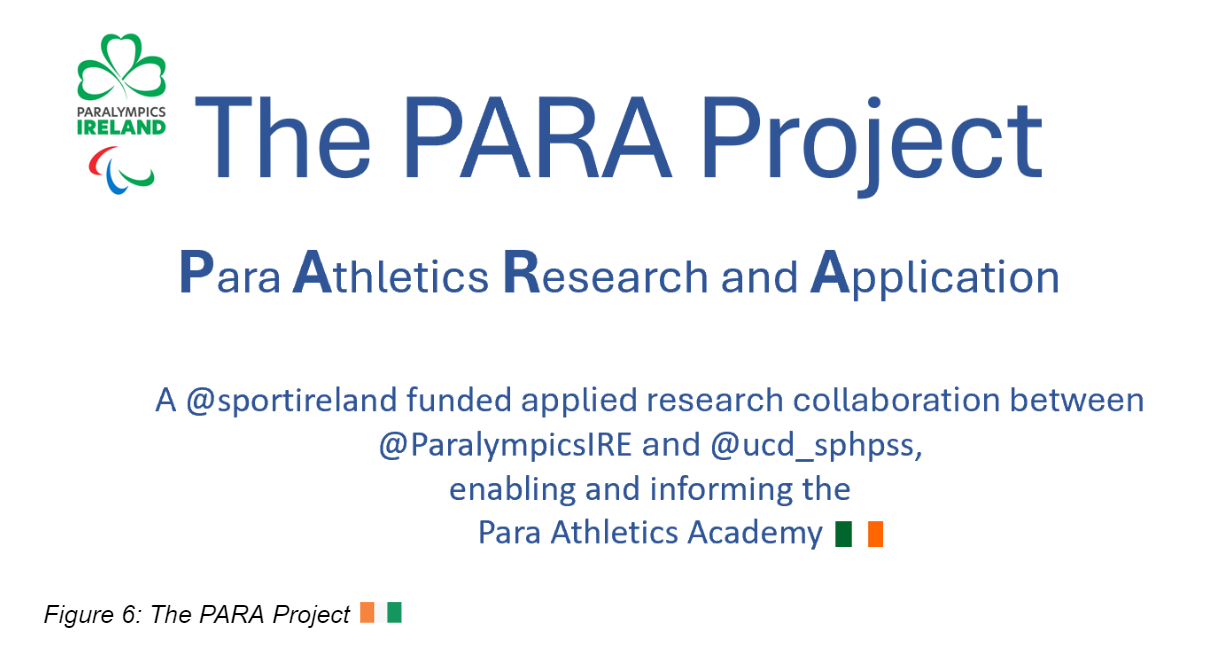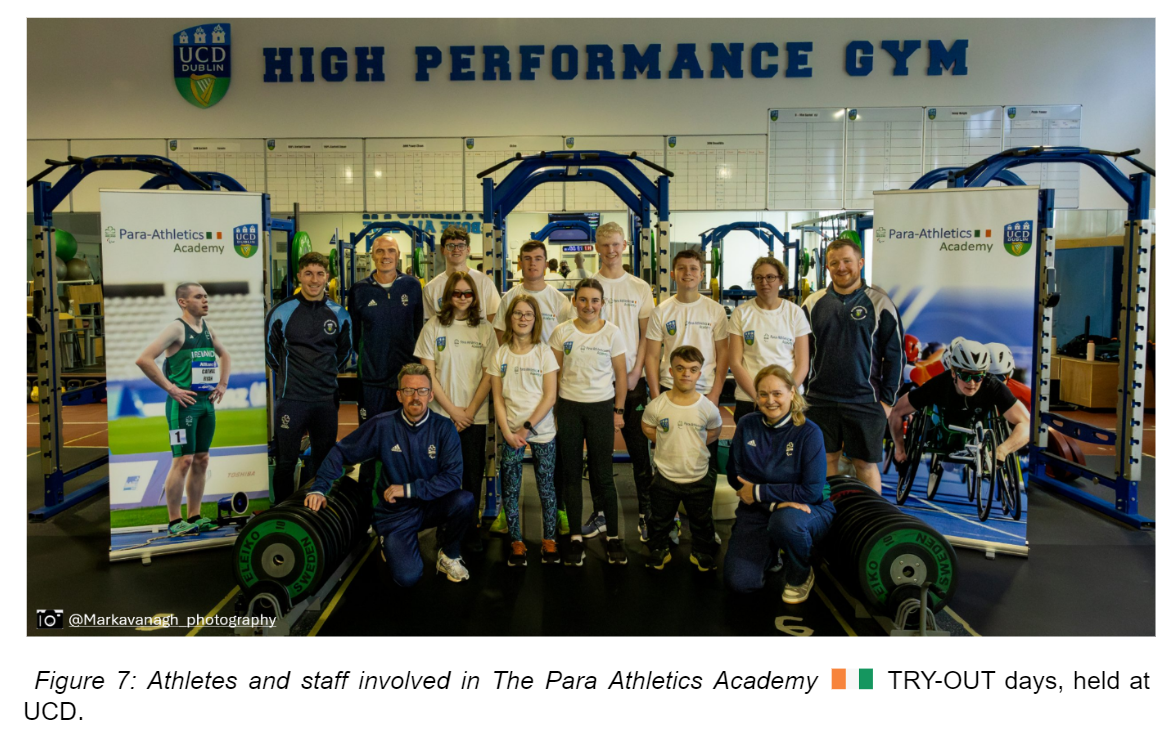Dr Alison O’Riordan: The PARA Project: Applied research enabling and informing a sustainable Para Athletics programme.
Background: Dr Alison O’Riordan is a sports professional, educator and researcher with more than 30 years global experience in various positions within public and private sectors. She is a Paralympic specialist with 20-years’ involvement in Para sport, particularly athletics. Paris 2024 will be her 6th Paralympic Games and the 2nd with Team Ireland.
Regarded as a world leader in seated throws research, Alison has a PhD in biomechanics with a significant publication record and presents around the world in this area.
The role: Alison is currently the Technical Lead for Para Athletics in Ireland working across Performance and the newly developed Talent Pathways. She will be a part of the PARA Project research supervisory team and will be responsible for the application of the research outcomes to the development of the Para Athletics Talent Pathway including the Para Athletics Academy.
Para Athletics Programme Development Story
The next few weeks are an important time in the Paris 2024 Paralympic Games cycle with #TeamIreland athlete selection taking place, and then onto the Games. As such I wanted to reflect on the important work that has been done over the last 18 months for the Para Athletics programme, and how research has enabled, shaped and will secure the future for the programme.
The Para Athletics team has been very successful over several Paralympic Games. However, with the retirement of key athletes in recent times, the succession of athletes coming through is limited. This is partly due to there being no formal talent pathway for Para athletes. The significant milestones and in-roads we have made should allow for a sustainable programme, highlighted below (Figure 1).
Para Athletics Pathway development
The Para Athletics Pathway was introduced in September 2023, highlighting both Talent and Performance entry and exit points (Figure 2). Despite significant recent athlete retirements, there is a cohort of athletes on the Performance Pathway (Senior Panel) who receive Sport Ireland funded programme support and individual athlete carding. Some of these athletes will shine in Paris and others in the 2028 Los Angeles Paralympics Games.
It was the Talent Pathway that needed attention as there were limited athletes coming through the system.
2. Para athlete recruitment
Finding potential athletes was addressed by launching our Para Athletics Virtual Talent Search (Figure 3) which proved highly successful. We received a significant number of applications from athletes both in Ireland and from overseas. Most of these athletes were already participating in athletics and were members of athletics clubs. This is the athlete profile most likely to progress as it provides a potentially shorter timeframe along the Para Athletics pathway because they are already training and competing within the sport.
3. Para Athletics System Development
System development is crucial to enable and support new athletes coming into the sport. Two key focus areas were to increase inclusive competition opportunities, and athlete and coach development.
A. Expanding inclusive competition opportunities for Para athletes
For Para athletes to progress along the Para Athletics pathway, more inclusive competition opportunities need to be embedded into Athletics Ireland and school competition structures. We connected with Eamonn Henry at the @OffalySportsPartnership who has successfully run the Diversity Games for many years. Two events for ambulant athletes were successfully included into the current competition days for Primary and Secondary days at the Athlone International Stadium in January 2024, and the event was renamed Future Stars. Future Stars will continue and be expanded in future years.
Later in the year (June 2024), UCD Athletics within their annual Track and Field meet, included a Guest 100m race for ambulant athletes. This event was supported by the Para Athletics Academy (see later). This was possible due to the number of talented athletes that had been identified, particularly through the Para Athletics Virtual Talent Search athlete recruitment campaign. The athletes that competed included panel athletes Cathal Ryan and Alex Lee (Figure 4). The quality and level of the athletes competing was exciting to see and included athletes with vision, co-ordination and limb impairments.
We anticipate more inclusive competition opportunities being available in the future for Para athletes.
B. Coach education and development
To increase training opportunities within clubs for Para athletes, the development of athletes and coaches is essential. In partnership with Athletics Ireland and the Offaly Sports Partnerships, the ‘What is … Para Athletics Webinar Series’ was delivered (virtually) between January and April 2024 (Figure 5). Over 70 people attended with webinars delivered by experts in key event groups and officiating including Joe MacDonnell (multiple Paralympic medal-winning speed coach) and Dave Jessop (International Technical Official for World Athletics and World Para Athletics).
A second series of webinars will take place in Autumn 2024.
4. Creating a Sustainable System for Para Athletics
In recognition that a Talent Pathway and an Academy were needed (and without a formal funding stream as yet), an association was created between Para Athletics and Professor Kate Pumpa from UCD School of Public Health, Physiotherapy and Sports Science. Ironically, Kate and I had both been at the Australian Institute of Sport (AIS) at the same time back in the mid-2000s. It really is a small world!
4a. The PARA Project
This potential collaboration created an opportunity to apply for a Sport Ireland research grant where the focus would be on exploring the development of talent identification and athlete pathways in Para Athletics. It was the first year that a 3-year pathway was offered to enable Sport Ireland partners an opportunity to connect with Higher Education Institutions to develop a doctoral level research project. Great news - we were successful! A superb achievement.
After a lengthy recruitment and interview process, Annmarie Caroll was successful in securing the PhD candidature and The PARA Project was formed (Figure 6), which will enable and inform the Para Athletics Academy .
4b. Para Athletics Academy
It was always the intention to form a Para Athletics Academy to support and educate talented athletes, their coaches and parents along the Para pathway. However, we were not able to do this until some of the processes detailed above were implemented.
To raise awareness and excitement about this great new initiative, a series of Para Athletics Academy TRY-OUT days were organised (Figure 7). According to a pre-determined criteria, several athletes were invited to TRY-OUT, using the superb sporting facilities at UCD. Athletes were able to experience monitoring and testing and event specific coaching by Para Athletics and UCD performance staff.
The Para Athletics Academy selection criteria and performance standards for the 2024-2025 year have been created. Athletes now have the summer competition season to secure performances. The Academy will officially start in with Autumn 2024 with in-person testing and coaching days alongside a performance education programme for the athletes, their coaches and parents.
The future is bright for Para Athletics
For more information and to make contact, click on the links below:
Author Bio: As the Director of her own Sports Consultancy, Dr O’Riordan had worked and consulted successfully with several sporting organisation including the Australian Institute of Sport, Athletics Australia, England Athletics, British Athletics, UK Coaching, World Academy of Sport and Paralympics Ireland. She is also a Non-Executive Director for UK Anti-Doping.
https://www.linkedin.com/in/dr-alison-oriordan-phd/
https://twitter.com/Ali_ORiordan

